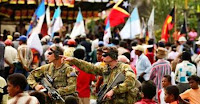 APEC energy officials meeting in Northern Australia have stepped from the air-conditioned conference room inside Darwin's Parliament House to the elevated balcony to spy this unusual sight. It's a giant inflatable nuclear power stack erected by protesters who don't want a nuclear power industry in Northern Australia. Currently there is one uranium mine - the Ranger Uranium mine - which operates on a lease inside the World Heritage listed Kakadu National Park and there is pressure on traditional aboriginal owners - the Mirrar people - to agree to a second mine closeby at Jabiluka. The Mirrar's senior custodian, Yvonne Margarula, has for years strongly opposed Jabiluka's development, often explaining that uranium mining at Ranger had upturned aboriginal people's lives, brought access to alcohol and created arguments - mostly about money.
APEC energy officials meeting in Northern Australia have stepped from the air-conditioned conference room inside Darwin's Parliament House to the elevated balcony to spy this unusual sight. It's a giant inflatable nuclear power stack erected by protesters who don't want a nuclear power industry in Northern Australia. Currently there is one uranium mine - the Ranger Uranium mine - which operates on a lease inside the World Heritage listed Kakadu National Park and there is pressure on traditional aboriginal owners - the Mirrar people - to agree to a second mine closeby at Jabiluka. The Mirrar's senior custodian, Yvonne Margarula, has for years strongly opposed Jabiluka's development, often explaining that uranium mining at Ranger had upturned aboriginal people's lives, brought access to alcohol and created arguments - mostly about money.There's another nuclear issue brewing in Northern Australia. Aboriginal elders living on a remote Northern Territory community have agreed to accept $12 million for allowing Australia's first nuclear waste dump to be built on their land.
Under the deal, Canberra would take the land for up to 200 years to store nuclear waste. Up to 150 truckloads of radioactive material would be driven thousands of kilometres from Lucas Heights in Sydney and Woomera in South Australia to the site. Suspend your judgement about what this could all mean and click here for taste of what this same issue has produced elsewhere.
... And back to the APEC meeting in Darwin for one moment. Greenpeace is questioning why no renewable energy representatives were on a key panel at the meeting. Other protesters used the opportunity of visiting nations to voice their anger at human rights abuses in Indonesia's West Papua. The flag on display (right) is "The Morning Star" - the independence flag of the Free Papua Movement.





![[SGE.BNV36.090507103724.photo00.quicklook.default-245x167.jpg]](https://blogger.googleusercontent.com/img/b/R29vZ2xl/AVvXsEiC6fgagYtpnYNnjxd3rNQwfrclmt3jby_pbSMokeXJDHpmrEXJBgkfTVP1G9MHD75RMJdDnzCZohPOpU-UfGYkaTJHozVPDvAED3tqVbt2suYrWD5DRN_UNO1CCDHG1lGxDnzu/s1600/SGE.BNV36.090507103724.photo00.quicklook.default-245x167.jpg)





